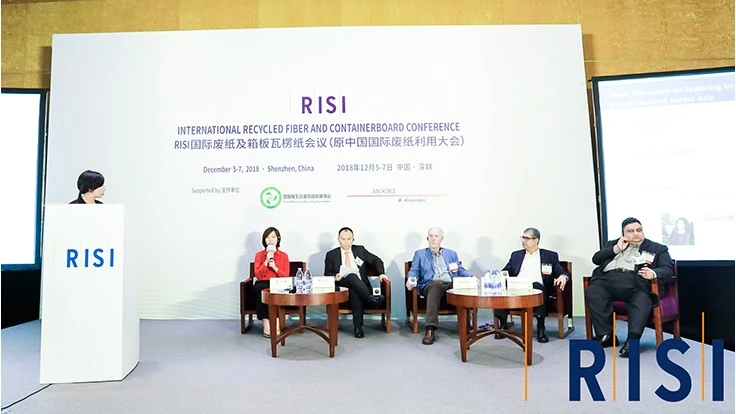
Photo courtesy of RISI.
Considering the turmoil in the recycling sector in the previous 12 months, topics of discussion were not hard to come by at the 2018 RISI International Recycled Fiber and Containerboard Conference, held in December in Shenzhen, China.
Weng Haidong, the head of corporate development for Xiamen, China-based C&D Paper & Pulp, said the market for scrap paper globally and China will need to be “rebalanced” following the events of 2018, most notably including scrap paper import restrictions enacted by China and then other Asian countries.
He said the new scarcity of supply and high price of old corrugated containers (OCC) and scrap paper in general has been met with quick responses by China’s containerboard and packaging industries. This includes a move to packaging lightweighting as a means of consuming less fiber.
Regarding changes such as three-layer boxes replacing five-layer ones, or the use of plastic to replace containerboard, “Once these [substitutions] occur, they don’t change back,” declared Weng.
Weng said China’s paper industry likely will experience a 7 million-ton swing in trade in 2018 compared to the previous year. While China was a net exporter of some 5 million tons of finished paper in 2017, it likely will have been a net importer of 2 million tons in 2018.
In a panel discussion at the conference, Huang Zhengkan of China-based paper producer Shanying International said 2018 had resulted in a supply chain that “has become extremely complicated [and] time consuming,” but that Shanying is adjusting to the new circumstances.
Dan Cotter of United States-based Cellmark Recycling said the year had brought “chaos,” but remarked that “as a trader, chaos offers us opportunities.” He said the chaos also had “made life difficult for our customers and suppliers,” and that he sees “significant changes coming” to residential collection programs in the U.S., which largely have deployed single-stream systems this decade.
Mumbai-based trader Inder Aurora of Tradecom International Pvt. Ltd. said China’s tight quality restrictions had provided a “wake-up call to the world.” Recyclers, he said, “should not just talk about recovery rates, but talk about how scrap is collected.”
Rahul Kejriwal of New York-based Go Green/Kejriwal called the restrictions “a good decision” by China’s President Xi Jinping. He continued, “I think the last 20 years was a mistake,” adding “a lot of this paper should not have been made in China” with recovered fiber that was shipped half-way around the world.
Kejriwal said that while media coverage had portrayed America as the loser in China’s scrap restrictions, he disagreed both with that narrative and with Cotter’s concern about the single-stream system. “I think American single-stream is here for good,” he stated.
“China is going away as a market in two years. In that time, new capacity in North America and Europe will absorb this fiber—even mixed paper,” Kejriwal continued. “America will innovate, research and make adjustments to handle that fiber. They will not change their system to make China happy or to make India happy.” Kejriwal said his company is among those seeking to expand capacity in America and Europe, to the tune of some 5 million tons per year.
Regarding the 2018 woes of American paper recyclers, he added, “America applauds when someone fails and bounces back; it does not punish failure. It’s a big problem today, but they’ll solve it.”
Tang Yanju of the Beijing-based China Resource Recycling Association (CRRA) said within that nation the restrictions prompted mill operators to “establish that they are recycling plant operators,” taking a “more systematic approach to domestic recycling.” This means, she said, that “quality will be enhanced.”
Latest from Recycling Today
- BMW Group, Encory launch 'direct recycling’ of batteries
- Loom Carbon, RTI International partner to scale textile recycling technology
- Goodwill Industries of West Michigan, American Glass Mosaics partner to divert glass from landfill
- CARI forms federal advocacy partnership
- Monthly packaging papers shipments down in November
- STEEL Act aims to enhance trade enforcement to prevent dumping of steel in the US
- San Francisco schools introduce compostable lunch trays
- Aduro graduates from Shell GameChanger program





